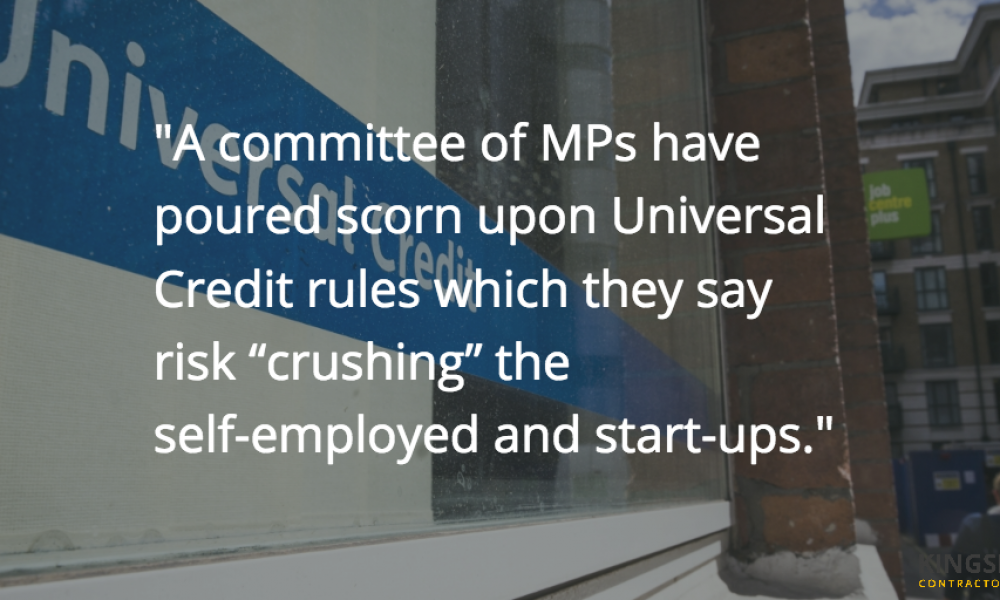A committee of MPs have poured scorn upon Universal Credit rules which they say risk crushing the self-employed and start-ups. In a ‘supporting self employment report‘ published 10th May, the MPs state that the benefit has been designed with little regard for people starting and running their own business? with the ultimate consequence not stopping far short of crushing potentially viable, productive enterprises.
Despite freelancers, contractors, and the self-employed making up around a sixth of the entire UK workforce, the revelations come as little surprise given the cavalier attitude the government has displayed towards them in the past. With IR35 reform rumbling on, and a rolling out of private sector reform appearing inevitable, the Universal Credit blow is simply the latest example of the callous disregard shown towards an area of the workforce that has continued to grow despite the obstacles placed in its path.
The cross-party group of MPs, chaired by Labour’s Frank Field, note that self-employed individuals who do not meet an arbitrary minimum income level from their business after just 12 months will be stripped of benefits and, as such, may well be forced to stop working for themselves and find other forms of employment.
Furthermore, the report notes, the Universal Credit system does not take into account the vagaries of seasonal work in industries like farming and tourism, meaning that people who are employed in those sectors stand to lose out on thousands of pounds because of the way the benefit is calculated.
The MPs of the Commons Work and Pensions Committee detailed how Universal Credit was designed with little regard for the reality of self-employed work, with the government failing to take into account the fact that many new businesses will need longer than just a year to become viable.
Universal Credit was not designed with self-employment in mind and it shows, said Frank Field. The 5 million or so self-employed people in the UK play a crucial role in bolstering a sometimes unstable economy, but any impact they have made appears to have been brushed off without much of a thought.
Although the MPs accept that the minimum earning floor, a threshold in place to prevent the taxpayer from effectively subsidising unviable businesses for an indeterminate amount of time, is necessary, they say that it is not flexible enough.
As it stands, self-employed individuals are granted a one-year ?start-up period? to get a business up and running, but the committee believes that period should be extended to three.
Currently the minimum income floor stipulates that claimants who have been self-employed for a year or more must earn the equivalent of at least 35 hours at the national minimum wage each month. If their earnings are less than that figure, Universal Credit will not make up the difference. If their earnings exceed that figure, then their benefit payment is reduced accordingly.
In an analysis published last month, Citizens Advice found that self-employed workers whose earnings fluctuate from month-to-month could receive hundreds of pounds less from Universal Credit benefit over the course of a year in comparison to regular employees who earn the same amount in their monthly salary.
Reached for comment by the Guardian, the Department for Work and Pensions remained unrepentant: We recognise the important role of entrepreneurs in boosting the economy, however it’s unsustainable for universal credit to prop up unviable businesses that may not be working. Universal credit strikes the right balance between helping new businesses and being fair to the taxpayer by supporting self-employed people during the first year while they establish their business.
After the initial year, gainfully self-employed people are treated as if they are earning the minimum wage. If they are not and they want to maintain the same level of income, they will be expected to increase their earnings rather than relying on their UC payment.
Backing up the findings of the report, and arguing against the DWP, Mike Cherry, the chairman of the Federation of Small Business, said: The minimum income floor is bad for entrepreneurialism, pure and simple. We know that it generally takes two to three years to get a viable firm off the ground. The universal credit system fails to recognise that fact and, in doing so, threatens the futures of successful firms.
Whether the government takes on board the recommendations made to them in the report remains to be seen, but we hope that the self-employed community will continue to persevere and grow in spite of any ill-judged attempts to hamper them.
